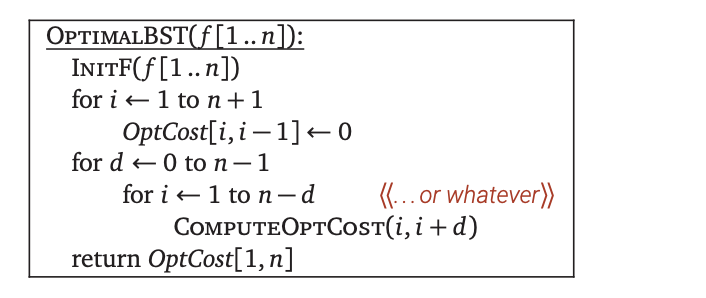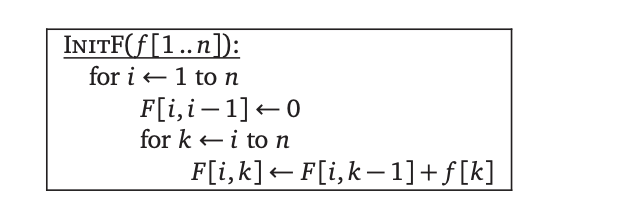Answered step by step
Verified Expert Solution
Question
1 Approved Answer
Implement the chosen OptimalBSTi programming language of your choice OPTIMALBST(f1..n INITF(f[1.. n]) for l 1 to n + 1 OptCost[1, 1-1] 0 for d-0 ton-1
Implement the chosen OptimalBSTi programming language of your choice



OPTIMALBST(f1..n INITF(f[1.. n]) for l 1 to n + 1 OptCost[1, 1-1] 0 for d-0 ton-1 fori1 ton-d.or whatever)) COMPUTEOPTCoST(i,i+d) return OptCost[1, n] for l 1 to n Fli, 1-1] 0 for k i to n Fli, k] r(i, k-1]+f[k] optCost[i, k] oo for r 1 to k tmp . OptCost[i, r-1] + OptCost[r + 1, k] if OptCOst[i, k] tmp OptCost[i, k] tmp OptCosti, k] OptCost[i, k] +Fi, k] OPTIMALBST(f1..n INITF(f[1.. n]) for l 1 to n + 1 OptCost[1, 1-1] 0 for d-0 ton-1 fori1 ton-d.or whatever)) COMPUTEOPTCoST(i,i+d) return OptCost[1, n] for l 1 to n Fli, 1-1] 0 for k i to n Fli, k] r(i, k-1]+f[k] optCost[i, k] oo for r 1 to k tmp . OptCost[i, r-1] + OptCost[r + 1, k] if OptCOst[i, k] tmp OptCost[i, k] tmp OptCosti, k] OptCost[i, k] +Fi, k]
Step by Step Solution
There are 3 Steps involved in it
Step: 1

Get Instant Access to Expert-Tailored Solutions
See step-by-step solutions with expert insights and AI powered tools for academic success
Step: 2

Step: 3

Ace Your Homework with AI
Get the answers you need in no time with our AI-driven, step-by-step assistance
Get Started


